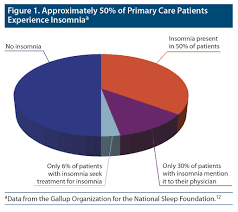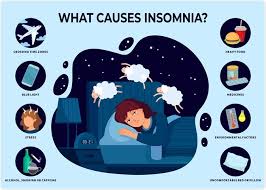Insomnia is a common sleep disorder that affects millions of people worldwide. It is characterized by difficulty falling asleep, staying asleep, or waking up too early and not being able to fall back asleep. Insomnia can have a significant impact on a person’s quality of life, affecting their mood, energy levels, and ability to function during the day.
Fortunately, there are several effective treatments for insomnia that can help people get the restful sleep they need. Here are some of the most common treatments for insomnia:
Cognitive Behavioral Therapy (CBT)
CBT is a type of therapy that focuses on changing negative thought patterns and behaviors that contribute to insomnia. It helps individuals identify and challenge negative thoughts about sleep, develop healthy sleep habits, and learn relaxation techniques.
Medications
There are several types of medications that can be used to treat insomnia. These include over-the-counter sleep aids like melatonin or prescription medications like benzodiazepines or non-benzodiazepine hypnotics. However, it’s important to use these medications only as directed by a healthcare professional as they can have side effects and may lead to dependence.
Lifestyle changes
Making lifestyle changes can also help improve sleep quality and treat insomnia. This includes avoiding caffeine and alcohol before bedtime, establishing a regular sleep schedule, creating a relaxing bedtime routine, and getting regular exercise during the day.
Sleep hygiene
Good sleep hygiene practices can also help treat insomnia. This includes creating a comfortable sleeping environment by keeping the bedroom cool and dark, avoiding electronic devices before bed, and using the bed only for sleeping.
Alternative therapies
Alternative therapies such as acupuncture or herbal supplements may also be used to treat insomnia. However, there is limited research on their effectiveness in treating this condition.
In conclusion, if you’re struggling with insomnia, it’s important to seek treatment from a healthcare professional who can help you identify the cause of your sleep problems and develop an effective treatment plan. With the right treatment, you can improve your sleep quality and get the restful sleep you need to feel your best.
7 Effective Tips for Treating Insomnia: A Guide to Better Sleep
- Stick to a sleep schedule
- Exercise regularly
- Avoid caffeine, nicotine and alcohol before bedtime
- Avoid large meals and beverages late at night
- Relax before bedtime
- Create a comfortable sleeping environment
- Talk to your doctor if necessary
Stick to a sleep schedule
One of the most effective tips for treating insomnia is to stick to a sleep schedule. This means going to bed and waking up at the same time every day, even on weekends. By establishing a consistent sleep schedule, you can help regulate your body’s natural sleep-wake cycle, making it easier to fall asleep and stay asleep.
When you stick to a sleep schedule, your body will begin to anticipate when it’s time for bed and when it’s time to wake up. This can help improve the quality of your sleep and reduce the amount of time it takes you to fall asleep.
To establish a consistent sleep schedule, choose a bedtime that allows you to get at least 7-8 hours of sleep each night. Then, set an alarm for the same time every morning and get up at that time, even if you didn’t sleep well the night before.
It may take some time for your body to adjust to a new sleep schedule, so be patient and persistent. Stick with it even on weekends or days off from work. Over time, sticking to a regular sleep schedule can become a habit that improves your overall health and well-being.
In addition to sticking to a sleep schedule, there are several other tips that can help improve your quality of sleep if you’re struggling with insomnia. These include practicing good sleep hygiene habits like creating a relaxing bedtime routine, avoiding caffeine and alcohol before bed, and keeping your bedroom cool and dark.
By making these small changes in your daily routine, you can take control of your insomnia and enjoy more restful nights of uninterrupted sleep.
Exercise regularly
Exercise is an excellent way to improve sleep quality and treat insomnia. Regular physical activity can help reduce stress, anxiety, and depression, all of which can contribute to sleep problems.
Studies have shown that people who exercise regularly report better sleep quality than those who don’t. Exercise can also help regulate the body’s internal clock, making it easier to fall asleep and wake up at the same time each day.
However, it’s important to note that timing is key when it comes to exercise and sleep. Exercising too close to bedtime can actually make it harder to fall asleep as it raises the body’s core temperature and stimulates the release of adrenaline and other hormones that can interfere with sleep.
To get the most benefit from exercise for insomnia treatment, aim to exercise earlier in the day, ideally in the morning or early afternoon. This will give your body enough time to wind down and relax before bedtime.
In addition to regular exercise, it’s important to establish good sleep habits such as creating a relaxing bedtime routine, avoiding caffeine and alcohol before bed, and keeping your bedroom cool and dark. With a combination of regular exercise and good sleep hygiene practices, you can improve your sleep quality and treat insomnia naturally.
Avoid caffeine, nicotine and alcohol before bedtime
If you’re struggling with insomnia, one of the most important steps you can take is to avoid consuming caffeine, nicotine, and alcohol before bedtime. These substances can all interfere with your ability to fall asleep or stay asleep throughout the night.
Caffeine is a stimulant that can keep you awake and alert for several hours after consumption. It’s found in coffee, tea, chocolate, and many soft drinks. If you’re sensitive to caffeine, it’s best to avoid consuming it altogether or limit your intake to the morning hours.
Nicotine is another stimulant that can disrupt sleep patterns. It’s found in tobacco products like cigarettes and e-cigarettes. If you’re a smoker or use other nicotine products, try to avoid using them before bed as they can make it harder for you to fall asleep.
Alcohol may help you feel drowsy and fall asleep faster initially, but it can also disrupt your sleep later in the night. Alcohol interferes with the normal sleep cycle and can lead to more frequent awakenings during the night, leaving you feeling tired and groggy in the morning.
To improve your chances of getting a good night’s sleep, try to avoid consuming caffeine, nicotine, and alcohol for several hours before bedtime. Instead, opt for relaxing activities like reading a book or taking a warm bath to help prepare your body for sleep. With these simple changes in your routine, you’ll be on your way to better sleep in no time!
Avoid large meals and beverages late at night
Avoiding large meals and beverages late at night is an important tip for treating insomnia. Eating a heavy meal or drinking too much before bed can cause discomfort, indigestion, and even heartburn, making it difficult to fall asleep or stay asleep throughout the night.
When we eat a large meal, our body has to work harder to digest the food, which can lead to physical discomfort and restlessness. Similarly, drinking too much liquid before bed can cause the need for frequent trips to the bathroom, disrupting sleep.
To avoid these issues, it’s best to finish eating at least 2-3 hours before bedtime and limit fluids in the evening. If you do feel hungry before bed, opt for a small snack that’s easy to digest like a banana or a handful of nuts.
By avoiding large meals and beverages late at night, you can improve your chances of getting a good night’s sleep. This will help you wake up feeling refreshed and energized in the morning, ready to take on the day ahead.
Relax before bedtime
Relaxing before bedtime is a simple yet effective tip for treating insomnia. Many people struggle to fall asleep because they are too wound up from the day’s activities or have racing thoughts about what they need to do tomorrow. Taking some time to unwind and relax before bed can help calm the mind and prepare the body for sleep.
There are many ways to relax before bedtime, and it’s important to find what works best for you. Some popular relaxation techniques include deep breathing exercises, progressive muscle relaxation, meditation, or taking a warm bath. You can also try reading a book or listening to calming music.
It’s important to avoid stimulating activities before bedtime, such as watching TV or using electronic devices. The blue light emitted from these devices can interfere with the body’s natural production of melatonin, a hormone that helps regulate sleep.
By practicing relaxation techniques before bed and avoiding stimulating activities, you can help train your body and mind to associate bedtime with relaxation and sleep. Over time, this can lead to improved sleep quality and overall well-being.
In conclusion, if you’re struggling with insomnia, try incorporating some relaxation techniques into your bedtime routine. By taking some time to unwind and calm your mind before bed, you can improve your chances of getting a restful night’s sleep.
Create a comfortable sleeping environment
Creating a comfortable sleeping environment is an important aspect of treating insomnia. Your bedroom should be a place of relaxation and tranquility, promoting restful sleep. Here are some tips to create a comfortable sleeping environment:
Keep the room cool and dark
A cool and dark room can help promote better sleep. Use blackout curtains or blinds to block out any light that may disturb your sleep. Keep the temperature between 60 and 67 degrees Fahrenheit for optimal comfort.
Invest in a good mattress and pillows
A good quality mattress and pillows are essential for a comfortable sleeping environment. Choose a mattress that provides adequate support for your body type and sleeping position, and pillows that are comfortable and supportive.
Avoid electronic devices before bed
Electronic devices emit blue light that can disrupt your body’s natural sleep-wake cycle. Avoid using electronic devices before bed, or use blue light blocking glasses if you must use them.
Use the bed only for sleeping
Using the bed for activities other than sleeping can create negative associations with sleep. Reserve the bed only for sleeping to promote better sleep habits.
Create a relaxing bedtime routine
Establishing a relaxing bedtime routine can help prepare your mind and body for sleep. This may include taking a warm bath, reading a book, or practicing relaxation techniques such as deep breathing or meditation.
In conclusion, creating a comfortable sleeping environment is an important aspect of treating insomnia. By following these tips, you can improve your sleep quality and promote restful sleep. Remember to consult with your healthcare professional if you continue to experience difficulty falling asleep or staying asleep despite making these changes to your sleeping environment.
Talk to your doctor if necessary
If you’re struggling with insomnia, it’s important to talk to your doctor if necessary. While there are many effective treatments for insomnia, it’s important to determine the underlying cause of your sleep problems before starting any treatment. Your doctor can help you identify any underlying medical conditions or medications that may be contributing to your insomnia.
In addition, your doctor may recommend cognitive-behavioral therapy (CBT) or prescribe medications to help you sleep better. They can also provide guidance on making lifestyle changes that can improve your sleep quality.
It’s important to note that some medications used to treat insomnia can have side effects and may lead to dependence if used improperly. Therefore, it’s essential to use these medications only as directed by a healthcare professional.
In conclusion, talking to your doctor is an essential step in treating insomnia effectively. They can help you identify the underlying cause of your sleep problems and develop an individualized treatment plan that meets your needs. With the right treatment and guidance from a healthcare professional, you can improve your sleep quality and enjoy better overall health and well-being.




